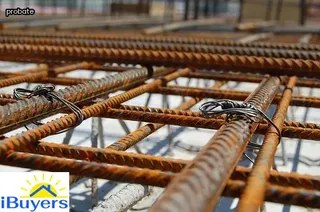Being a property owner in North Carolina comes with its own set of challenges, especially when it comes to the process of probate. Probate is an important part of real estate law in North Carolina and understanding the process is essential for anyone looking to sell a house in probate.
In order for a sale to be legally binding, it must go through the complicated process of probate. This involves filing paperwork with the court, proving ownership and going through a legal review before any sale can be finalized.
It is important to be aware of all laws and regulations related to probate in order to speed up the process and ensure that everything goes smoothly. Additionally, understanding how probates are handled in North Carolina can help potential buyers know what to expect before making an offer on a house in probate.
Knowing all of this information can make navigating North Carolina's probate system much easier for buyers and sellers alike.

Probate is a required step in the process of selling a house in North Carolina. It is necessary to open a probate case when the owner of the property passes away, as it provides an opportunity for creditors to be paid and allows for the deceased’s assets to be distributed according to their will.
While navigating North Carolina probates can be complicated, understanding when probate is needed can help make the process easier. When selling real estate that has been left behind by someone who has passed away, it is important to ensure that all legal requirements are followed.
The executor of the estate must file a petition in court and obtain Letters Testamentary or Letters of Administration. This grants them authority to close a sale on behalf of the deceased.
Additionally, all debts must be settled before any proceeds from the sale can be distributed amongst heirs. Understanding these steps and making sure they are completed correctly will help ensure that selling houses in probate is done legally and efficiently.
When it comes to navigating North Carolina probates, it is important for executors to understand their rights and obligations. Executors are responsible for settling the decedent's estate, which includes overseeing the sale of any real estate.
In order to do this successfully, executors need to be aware of their fiduciary duties, including protecting the assets of the estate, properly accounting for the disposition of those assets and avoiding conflicts of interest. They should also be familiar with certain laws that affect sales of real estate in probate, such as title insurance requirements and homestead exemption rules.
Furthermore, it is important for executors to understand how they can protect themselves from potential liability when selling an estate's property. By understanding these fundamentals, executors can successfully navigate North Carolina probates and guide buyers through the process of purchasing a house in probate.

When navigating North Carolina probates, it is important to understand the difference between executors and administrators. An executor is responsible for carrying out the instructions of the deceased's will and is appointed by the court.
On the other hand, an administrator is selected by the family or court to manage a decedent’s estate when no will has been left. This means that administrators are in charge of locating assets, paying debts, and distributing property to beneficiaries.
Furthermore, since executors have been named in a will and can be held liable for their actions, they are typically required to post a bond with the court for protection against any potential mismanagement or negligence. In contrast, administrators do not need to post a bond because they are appointed by the court and supervised by it as well.
As such, it is essential when selling a house in probate to determine who is responsible for managing the estate in order to ensure that all legal requirements are met.
Navigating North Carolina probates can be a daunting task. Understanding the legal process of selling houses in probate is key to a successful sale.
The North Carolina probate process involves several steps and considerations, including determining whether a court-supervised administration is necessary, appointing an executor or administrator to handle the estate, identifying and inventorying all assets of the deceased, paying creditors and settling any other debts, and distributing assets to beneficiaries according to the will or state law. It is important to note that there may be taxes due on any real estate sales, which must be taken into account when considering offers for properties in probate.
Depending on the size of the estate, there may also be fees involved such as filing fees for court documents and attorney's fees for legal advice. During this process, it is essential that all parties follow state laws regarding deadlines for filing documents as well as those for notifying potential creditors and heirs about the proceedings.
Finally, when selling a house in probate it is important to familiarize yourself with the rules of your local market so you can accurately assess comparable sales prices and market trends when setting an appropriate list price.

Navigating North Carolina probates can be daunting and time-consuming for those who are unfamiliar with the process. Knowing the steps to take when selling a house in probate is essential in order to ensure that all legal requirements are met and that the property is sold quickly and efficiently.
The first step is to obtain a copy of the decedent’s will, if one exists, from the county register of deeds office. This will provide important information about how the estate should be distributed among heirs.
Next, an executor must be appointed by a court; this person is responsible for managing the sale of assets from the estate. After that, any debts owed by the decedent must be paid off before any proceeds from the sale of any property can be distributed to heirs.
Once these steps have been completed, a real estate agent can then help guide buyers through the process of purchasing a house in probate in North Carolina; they can also assist with marketing and listing homes for sale on MLS (Multiple Listing Service). Finally, it is important to remember that each county has its own set of rules regarding probate sales, so it is wise to research those regulations prior to beginning any transaction.
Navigating North Carolina probates can be a tricky process, especially when it comes to selling houses in probate. In many cases, the sale or transfer of a home in probate requires the approval and signature of various legal documents before the sale can go through.
Legal documents may include titles, deeds, and death certificates, as well as court orders if necessary. Each document needs to be signed and notarized by the appropriate parties before being filed with the Register of Deeds in the county where the property is located.
Preparing these documents correctly and ensuring that all relevant information is included is essential for a successful transaction. Along with these required legal documents, additional paperwork may need to be completed such as affidavits of heirship or non-claim forms if multiple heirs are involved.
It is important to note that filing fees may also apply when submitting forms to the Register of Deeds office so it’s best to check beforehand what fees may apply in your case. Understanding which legal documents are required and properly preparing them is an essential part of navigating North Carolina probates when selling a house in probate.

Navigating the probate process in North Carolina can be a daunting task, especially when it comes to gathering and securing assets. It is important to understand the process so that you can properly organize and secure the assets for sale.
The first step is to identify which entities are responsible for managing the estate, such as the executor or administrator. Once identified, it is essential to obtain copies of all pertinent documents from the court system, including death certificates and wills.
After this information is gathered, contact must be made with any financial institutions that may have been involved with the deceased, such as banks or investment companies. As well, contact should be made with any creditors who may have claims against the estate.
Additionally, it is important to collect any tangible property of value such as jewelry or furniture that was owned by the deceased individual. Finally, make sure to locate all titles and deeds associated with real estate properties so they can be sold in compliance with legal requirements during probate proceedings in North Carolina.
It is critical to ensure all proper steps are taken throughout this process in order to properly gather and secure assets during probate proceedings.
Navigating North Carolina probates can be a complex process. It is important to understand the financial obligations associated with selling a house in probate, such as debts, taxes, and other expenses.
First and foremost, all debts must be paid before any proceeds from the sale of the house can be distributed among heirs. This includes mortgages, liens, credit card balances, medical bills, and other debt accrued by the deceased prior to death.
In addition to paying outstanding debts and mortgages, the estate may also owe various taxes depending on how long the deceased owned the property or holdings. Depending on circumstance, state or federal income taxes may need to be paid; estate taxes may also be owed if tax returns were not completed before passing.
Other financial obligations may include paying for property management fees or utility bills during the probate process. Navigating North Carolina probates requires being aware of these financial obligations that must be satisfied before profits from a house sale can be distributed among heirs.

Distributing the assets of an estate after all requirements are satisfied can be a tricky process. In North Carolina, probate is a legal process that involves validating a deceased person's will and distributing their assets to the beneficiaries.
Selling houses in probate is a complex task that requires knowledge of North Carolina's probate laws. When selling a house in probate, it is important to follow the state's strict guidelines to ensure the process goes smoothly.
The executor of an estate must first obtain letters testamentary from the clerk of court, which authorizes them to handle the affairs of the deceased. This includes advertising for bids on the property and then selling it to the highest bidder at public auction.
The proceeds from this sale must then be distributed according to North Carolina law and any applicable terms set forth by the court or specified in the will. After all debts have been paid and taxes taken out, any remaining funds are divided among any heirs or beneficiaries listed in the will or otherwise designated by law.
It is essential that executors understand North Carolina probate laws in order to properly navigate this process and distribute assets appropriately once all requirements are satisfied.
Yes, it is possible to transfer property without probate in North Carolina (NC). NC law allows certain types of real estate transfers to take place without the need for formal probate proceedings.
These transfers include those between close relatives, transfers made through a trust or deed, and transfers that are paid for with life insurance proceeds. In addition, some counties offer an expedited transfer process that simplifies the transfer of property upon death.
This process can help eliminate costly court fees and lengthy delays associated with probate. When selling a house in probate, understanding these processes can be essential to ensure a successful transaction.

Yes, a house can be sold while in probate in North Carolina. The process of selling a house during probate is complicated and requires the assistance of a knowledgeable attorney.
Navigating North Carolina Probates: A Guide To Selling Houses In Probate provides valuable information and insight into this complex process. This guide outlines the key steps involved in selling a house during probate, including understanding the laws, filing necessary paperwork and procuring court approval for the sale.
Additionally, it covers topics such as protecting heirs’ rights, navigating the court system and resolving disputes between parties. With this guide, those interested in selling a home during probate can gain clear understanding of what steps are necessary in order to complete the sale and protect their rights throughout the process.
Yes, probate records are public in North Carolina. The North Carolina General Statutes Chapter 28A and Chapter 28 cover the rules and regulations for navigating probates in the state.
According to these statutes, all probate information is open to the public and can be accessed through county courthouses or online resources. This includes details regarding the assets of deceased persons, such as real property, which may include a house.
Knowing how to access this information is key when it comes to selling houses that are in probate in North Carolina. By being aware of these public records, buyers and sellers can have a better understanding of the process and make an informed decision on whether they should proceed with a purchase or sale.
In North Carolina, an estate can stay in probate for a maximum of 10 months from the time the decedent passes away. This includes all of the necessary steps from filing the petition for probate, to obtaining Letters Testamentary or Letters of Administration, to gathering assets, paying debts, and distributing property.
In some cases, this process can take longer if there are disputes among heirs or beneficiaries that must be settled through litigation. It is important to understand that each Probate case is unique and may require additional time depending on the size and complexity of the estate.
There are certain situations where a judge may extend this timeline beyond 10 months due to extraordinary circumstances. To ensure your estate navigates North Carolina Probates successfully and in a timely manner, it is important to have an experienced attorney guiding you throughout the entire process.